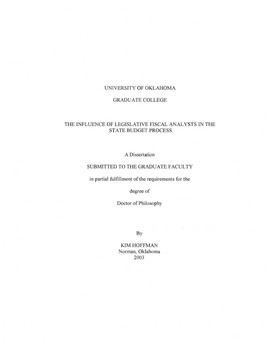| dc.contributor.advisor | Franklin, Aimee, | en_US |
| dc.contributor.author | Hoffman, Kim. | en_US |
| dc.date.accessioned | 2013-08-16T12:19:00Z | |
| dc.date.available | 2013-08-16T12:19:00Z | |
| dc.date.issued | 2003 | en_US |
| dc.identifier.uri | https://hdl.handle.net/11244/617 | |
| dc.description.abstract | This research found that the majority of all respondents perceived legislative fiscal analysts to be influential in the state budget process, although different degrees of influence were found among the four states under study. Legislative fiscal analysts are influential in the budget process because they are information providers. In addition to providing basic budgetary information, legislative fiscal analysts are influential because they narrow the range of legislative discussion by identifying issues, developing policy alternatives, and/or making specific budget recommendations. The provision of information can occur through a variety of duties and roles that legislative fiscal analysts perform. The most important duty performed by the legislative fiscal analysts is the review and analysis of agency requests and executive recommendations. Of the various roles that analysts can take on during the budget process such as clerical worker, monitor of expenditures, facilitator of information, and policy initiator, the facilitator role was found to be the most appropriate role for most of the legislative fiscal analysts in this study. The ability of some analysts to make budget recommendations for the legislature, a duty associated with the policy initiator role, gave rise to higher perceived levels of influence for some of those analysts. Expertise in a particular policy area, tenure on the job, frequency of contact with other key budget actors, and visibility in the budget process are also important factors conditioning influence. | en_US |
| dc.description.abstract | This study assessed the duties, roles, relationships, and influence of legislative fiscal analysts in the state budget process. Key budget actors including legislative fiscal analysts, legislators, agency personnel, and executive budget analysts were interviewed by telephone in four states, Arizona, Colorado, Kansas, and Maine. The research answers several broad questions. First, what are the primary duties and most useful types of information provided to legislators by legislative fiscal analysts? Second, what are legislative fiscal analyst roles and relationships with legislators, agency personnel, and executive budget analysts? Third, what is the perceived level of legislative fiscal analyst influence? Finally, what are the factors that condition this influence? | en_US |
| dc.format.extent | iv, 406 leaves : | en_US |
| dc.subject | Legislative bodies United States States Officials and employees. | en_US |
| dc.subject | Political Science, Public Administration. | en_US |
| dc.subject | Budget Law and legislation United States States. | en_US |
| dc.subject | Fiscal policy United States States. | en_US |
| dc.subject | United States Appropriations and expenditures, State. | en_US |
| dc.subject | Finance, Public United States States. | en_US |
| dc.title | The influence of legislative fiscal analysts in the state budget process. | en_US |
| dc.type | Thesis | en_US |
| dc.thesis.degree | Ph.D. | en_US |
| dc.thesis.degreeDiscipline | Department of Political Science | en_US |
| dc.note | Source: Dissertation Abstracts International, Volume: 64-06, Section: A, page: 2250. | en_US |
| dc.note | Major Professor: Aimee Franklin. | en_US |
| ou.identifier | (UMI)AAI3093585 | en_US |
| ou.group | College of Arts and Sciences::Department of Political Science | |
